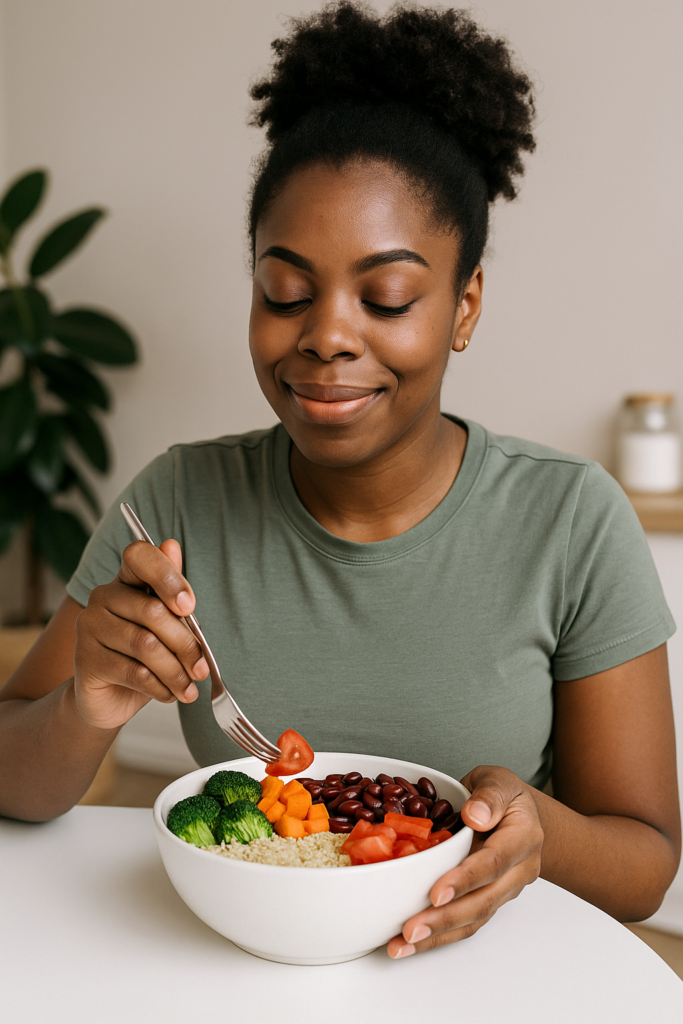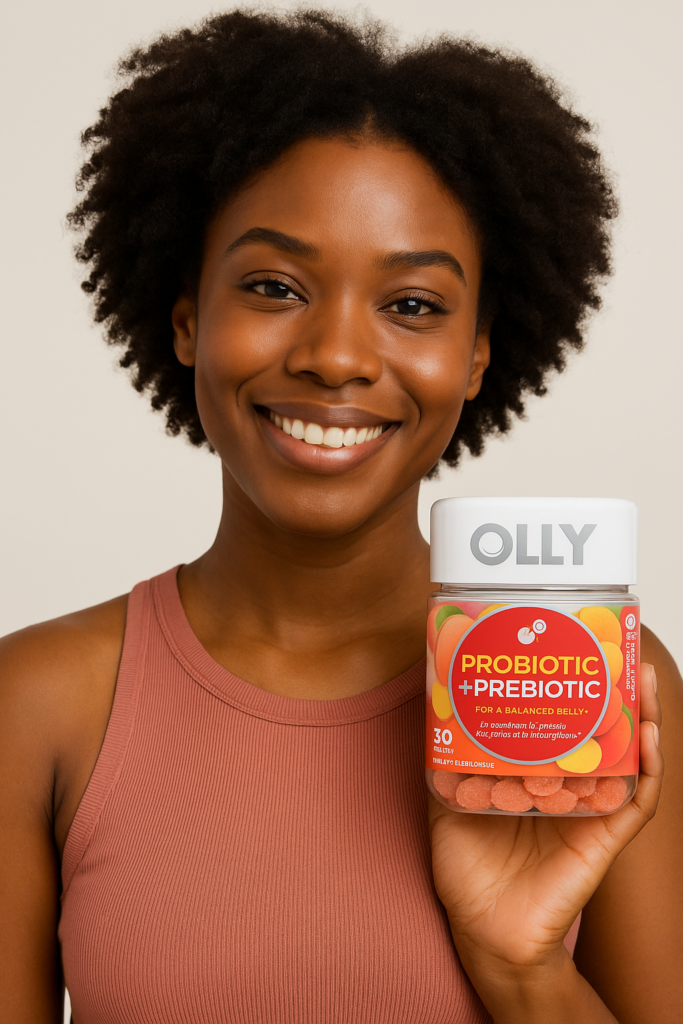Black Girl Aesthetics contains affiliate links and is a member of the Amazon Services LLC Associates Program. If you click or make a purchase using one of these affiliate links, we may receive compensation at no extra cost to you. See our Privacy Policy for more information.
Gut health has become one of the most talked-about wellness topics — and for good reason. A well-functioning gut supports everything from glowing skin to balanced moods, better immunity, and even mental clarity.
For Black women, this topic deserves special attention. Cultural foods, unique stressors, underrepresented medical experiences, and lifestyle patterns all influence how our bodies process food, store nutrients, and maintain internal balance.
Whether you’re just beginning your wellness journey or leveling up your lifestyle, this ultimate guide will give you a comprehensive, culturally informed look at improving your gut health in a way that honors both your body and your background.

Understanding Gut Health
Your gut — technically your gastrointestinal tract — is home to trillions of bacteria, fungi, and microbes. This vast internal community is called your gut microbiome, and it plays a massive role in your body’s function. Think of it as your body’s control center for digestion, immunity, skin health, and even mental wellness.
A Healthy Gut Microbiome Leads To:
- Regular, pain-free digestion
- Reduced inflammation
- Balanced hormones
- Better energy and sleep
- Mental clarity and reduced anxiety
- Clearer, more radiant skin
But when your gut is imbalanced — a condition known as dysbiosis – your body may start to send red flags like:
- Bloating and gas
- Constipation or diarrhea
- Frequent fatigue
- Sugar cravings
- Acne flare-ups
- Brain fog and mood swings
🧠 Fun Fact: The gut is often called the “second brain” because it contains over 100 million neurons and communicates directly with the brain through the gut-brain axis. That’s why an unhealthy gut can also affect how you feel emotionally.
Gut Health Tip:
Want a daily reset? Start your morning with a gut health smoothie — blend banana, kefir or coconut yogurt, spinach, and chia seeds for a fiber-rich, microbiome-loving meal that tastes amazing.
Why Gut Health Matters Specifically for Black Women
When it comes to wellness, Black women often face a double bind — navigating health disparities and societal stressors while trying to prioritize self-care in a world that doesn’t always prioritize us. Gut health is no exception. In fact, it’s deeply connected to many of the health challenges disproportionately affecting Black women today.
Let’s break it down:
Vitamin D Deficiency
Due to higher melanin levels, Black women naturally absorb less vitamin D from sunlight — and that matters because vitamin D plays a big role in gut barrier integrity and inflammation regulation. Low levels may contribute to poor gut function, fatigue, and weakened immunity.
Chronic Stress
The constant pressure of navigating racial and gender-based stressors can lead to chronic cortisol elevation. This hormone disrupts the gut-brain axis, alters gut bacteria, and leads to symptoms like bloating, stomach cramps, and erratic digestion.
Food Access Disparities
Many communities face limited access to fresh produce and affordable whole foods. This leads to overreliance on ultra-processed, fiber-poor options that don’t nourish the gut — especially for families working with tight budgets or living in food deserts.
Cultural Food Traditions
Our food tells stories. And while some traditional meals may be high in oil or starch, that doesn’t mean they’re inherently “bad.” With small adjustments — like adding fiber-rich sides or using olive oil over vegetable oil — our cultural foods can still support gut health.
Example: Add sautéed kale or fermented cabbage alongside your fufu and egusi soup, or swap white rice in jollof for brown rice occasionally.
Why a Culturally-Aware Approach Matters:
Black women are often underrepresented in clinical studies, yet overrepresented in gut-related conditions like:
- IBS (Irritable Bowel Syndrome)
- Autoimmune diseases (e.g., lupus, Crohn’s)
- PCOS and estrogen imbalances (both affected by gut bacteria)
- Food intolerances like lactose sensitivity
When wellness spaces don’t reflect us, they miss key pieces of the story — like how generational trauma and structural inequalities affect our bodies down to the cellular level.
This guide is your reminder that you deserve wellness tools that are as unique, powerful, and radiant as you are.
Common Gut Health Challenges for Black Women
Black women face unique physiological and cultural health intersections — and that often means our gut health journey looks different. Whether you’re noticing signs like bloating after dairy or unexplained fatigue, it’s important to recognize that you’re not alone — and you’re not imagining it.
Let’s explore some of the most common gut challenges faced by Black women, and how to address them with empathy, intention, and science-backed solutions.
1. Irregular Digestion
It’s not uncommon for digestion to fluctuate due to stress, travel, food, or hormones. But if you’re often dealing with:
- Constipation
- Diarrhea
- Abdominal cramping
- Incomplete bowel movements
…your gut microbiome could be out of sync.
🧘🏾 Lifestyle tip: Start your morning with a probiotic-rich gut health smoothie and a short stretching session to stimulate digestion naturally
2. Food Intolerances (Especially Dairy)
Studies show that up to 80% of Black adults may be lactose intolerant, yet dairy products are everywhere — from breakfast smoothies to post-gym snacks.
Signs of dairy intolerance include:
- Bloating
- Gas
- Stomach cramps
- Skin breakouts
🧠 Swap It: Use dairy-free alternatives like coconut yogurt, almond milk, or dairy-free Activia (which now has plant-based options with probiotics)
3. IBS & Inflammation
Irritable Bowel Syndrome (IBS) is a gut disorder that can cause:
- Sudden urges to use the bathroom
- Chronic bloating or gas
- Cramping
- Alternating constipation and diarrhea
Black women are often underdiagnosed or misdiagnosed, partly due to bias in the healthcare system and a lack of culturally competent care.
Natural Support:
- Anti-inflammatory teas (ginger, chamomile)
- Daily probiotic gummies like OLLY Probiotic + Prebiotic
- Avoiding processed foods and refined sugar
4. Medication-Related Gut Disruption
Many medications — including antibiotics, birth control, and NSAIDs (like ibuprofen) — can disrupt gut flora and contribute to issues like:
- Yeast overgrowth
- Poor nutrient absorption
- Bloating or IBS flare-ups
Support your gut with:
5. Lack of Diversity in the Diet
Our microbiome loves variety. When we eat the same 5–10 foods over and over, our gut bacteria don’t get the wide range of nutrients they need to thrive.
Try this:
- Rotate different greens (collards, kale, dandelion)
- Eat different grains (quinoa, millet, brown rice)
- Include fermented foods (kombucha, kimchi, pickled okra)
By understanding these challenges and addressing them with cultural insight and practical tools, you can begin to heal your gut from the inside out.
Nutrition Strategies for Gut Health
If food is medicine, then gut health starts in the kitchen. The right ingredients — prepared in nourishing, culturally aware ways — can transform your digestion, energy, skin, and even mental clarity.
This section includes a breakdown of gut-friendly ingredients, smoothies for gut health, juicing for gut health, fermented foods, and daily routines that make your belly happy without sacrificing flavor or heritage.

1. Eat a Rainbow of Plants
A diverse gut microbiome thrives on plant variety. Aim to eat as many colorful whole foods as possible — not just for their vitamins, but for the prebiotic fiber that feeds your good gut bacteria.
Include:
- Collard greens, kale, spinach
- Sweet potatoes, okra, carrots
- Blueberries, mangoes, apples
- Plantains, papaya, bell peppers
📝 Pro Tip: Create a weekly meal planner that challenges you to eat 15+ different plants. Your gut loves variety.
2. Boost Fiber Intake
Fiber isn’t just for regularity — it’s also food for your microbiome. Most women only get about half the recommended daily fiber, which is 25–35g/day.
Easy ways to increase fiber:
- Add 1 tablespoon of ground flax or chia seeds to smoothies or oatmeal
- Toss lentils or black beans into stews or salads
- Swap white rice for quinoa or brown rice
- Choose whole fruits instead of juice
3. Gut Health Smoothies (Keyword: smoothie for gut health)
Smoothies are an easy, delicious way to deliver fiber, probiotics, and anti-inflammatory nutrients.
Gut Health Smoothie Recipe:
- 1 frozen banana (prebiotic fiber)
- 1 handful of spinach or kale
- 1 tbsp flaxseed (omega-3s + fiber)
- ½ cup kefir or coconut yogurt (probiotics)
- 1-inch ginger root (anti-inflammatory)
- Water or almond milk
✨ Blend and enjoy a gut reset in a glass. For best results, drink it first thing in the morning.
Want more recipes? Read: 5 Gut-Healing Smoothies Black Women Should Try
💡 Get our FREE Gut Health Smoothie Recipe PDF
4. Juicing for Gut Health (Keyword: gut health juice)
Juicing isn’t just trendy — when done right, it can help soothe inflammation and feed your gut. But remember: juicing removes most of the fiber, so balance it with fiber-rich meals.
Top Gut-Boosting Juice Combos:
- Beet + carrot + apple → blood flow, digestion
- Celery + lemon + cucumber → bloat relief
- Pineapple + ginger + mint → digestion + enzyme support
See more in our guide: Juicing for Gut Health: Recipes & Tips
Recommended: Omega Cold Press Juicer on Amazon
🍋 Tip: Add chia seeds after juicing for a fiber boost.
5. Add Fermented Foods
Fermented foods contain live probiotics that help repopulate your gut. They also support nutrient absorption and reduce sugar cravings.
Try adding:
- Kimchi or sauerkraut (on wraps or bowls)
- Plain Greek yogurt or dairy-free Activia
- Miso (as soup or a sauce base)
- Pickled okra or beets
New to fermented foods? Beginner’s Guide to Fermenting for Gut Health
Buy: Bubbies Sauerkraut
🧪 Want to level it up? Try homemade pickling or batch fermenting veggies!
6. Best Kombucha for Gut Health
Kombucha is a fermented tea that delivers a healthy dose of beneficial bacteria, along with B vitamins and acids that promote detox.
🥂 Top picks (low sugar):
- Health-Ade Kombucha – unique flavors, small-batch
- GT’s Synergy – widely available, bold taste
- Remedy Kombucha – zero sugar, gut-verified
✨ Want to try it? Here are the Top 5 Kombuchas for Gut Health
Try Health-Ade Kombucha Sampler Pack
Start slow — ½ a bottle a day is plenty if you’re new to it.
7. Reduce Gut-Offending Foods
You don’t need to give up everything. But reducing or rotating out certain foods can help your microbiome heal:
- Ultra-processed snacks
- Artificial sweeteners
- Fried, greasy foods
- Added sugars
- Excess dairy (especially for those with intolerance)
✨ Balance, not restriction. Enjoy your faves with gut-friendly swaps (like air frying plantains or using olive oil instead of canola).
Tip: Don’t stress perfection — balance is key!
Lifestyle Habits That Support Gut Health
Healing your gut isn’t just about food — it’s also about how you live, move, rest, and manage stress. In fact, many Black women dealing with bloating, hormonal imbalance, or low energy are unknowingly battling chronic stress or poor sleep — both of which deeply impact gut health.
The good news? You can make lifestyle shifts without burning out or overhauling your entire routine. Here’s how.
1. Manage Stress (Gut-Brain Axis)
The gut and brain are in constant conversation via the vagus nerve. High stress → high cortisol → gut disruption. If your belly acts up when you’re anxious, you’re not alone.
Try this:
- Morning affirmations + journaling
- Deep breathing for 3 minutes before meals
- Grounding walks (barefoot on grass or sand)
- Download our Gut Health Habit Tracker to track how stress affects your digestion
Try the Insight Timer Meditation App (free), or use a Gratitude Journal for Women of Color
2. Prioritize Quality Sleep
Gut bacteria have circadian rhythms, too. When your sleep is off, your microbiome is too. Aim for 7–9 hours of restorative sleep.
Sleep tips:
- Keep your bedroom cool (60–67°F)
- Avoid screens 1 hour before bed
- Drink calming teas like chamomile or lemon balm
- Journal or stretch before bed
Try a Weighted Blanket for Sleep & Stress
Sip Traditional Medicinals Chamomile Tea
3. Move Your Body Daily
Movement stimulates digestion, reduces bloating, and lowers cortisol.
Joyful movement ideas:
- Dance (Afrobeats, soca, or Beyoncé Homecoming playlist!)
- 10-minute YouTube yoga for digestion
- Light stretching and deep belly breathing after meals
Internal resource:
Try our “Anti-Bloat Morning Routine” guide
4. Hydrate Like a Wellness Queen
Water is essential for every aspect of digestion — from breaking down food to keeping your colon regular.
Daily hydration goals:
- 8+ glasses (more if active or breastfeeding)
- Add lemon, cucumber, or mint for variety
- Sip slowly throughout the day — not all at once
Bonus: Tea for Gut Health
Herbal teas can calm the stomach, ease cramps, and reduce inflammation.
Top gut-friendly teas:
- Peppermint – for cramps and bloat
- Ginger – for nausea and digestion
- Chamomile – for stress-induced gut issues
- Rooibos – caffeine-free, antioxidant-rich
🛒 Try this bundle:
Pukka Organic Herbal Tea Variety Pack
Read: 10 Teas That Heal Your Gut
Supplements That Make a Difference
While a fiber-rich, whole-food diet should always be the foundation, supplements can fill critical gaps — especially for Black women navigating stress, inflammation, hormone imbalances, and vitamin deficiencies that directly impact gut health.
These gut-friendly supplements help restore balance, improve digestion, and reduce bloating.
1. Probiotics
Probiotics are live “good” bacteria that help keep your gut ecosystem balanced. They crowd out harmful microbes, support digestion, and even impact mood and skin.
What to look for:
- CFUs in the billions (e.g., 5–10B per serving)
- Strains like Lactobacillus acidophilus and Bifidobacterium lactis
- Shelf-stable if not refrigerated
OLLY Probiotic + Prebiotic Gummies (Peach Flavor) – tasty, easy to take, and effective.
✅ Includes 500M CFUs + prebiotic fiber
✅ No artificial sweeteners or colors
✅ Perfect for pill-averse wellness beginners
2. Prebiotics
Prebiotics are the non-digestible fibers that feed your good gut bacteria. Without them, probiotics won’t thrive.
Found in:
- Chicory root
- Asparagus
- Garlic
- Green bananas
- Oats
🛒 Supplement Option:
Hyperbiotics Organic Prebiotic Powder – tasteless, easy to mix into smoothies
3. Digestive Enzymes
If you feel bloated after meals, your body may be struggling to break down proteins, fats, or carbs. Digestive enzymes help support nutrient absorption and smoother digestion.
Use with:
- Heavy meals
- Dairy or high-protein dishes
- Times of stress or travel
🛒 Best Pick:
Zenwise Digestive Enzymes + Probiotics – includes enzymes, prebiotics, and probiotics
4. ☀️ Vitamin D3
Vitamin D helps regulate immune response, mood, and the integrity of your gut lining. Black women are at higher risk for deficiency, especially in colder months or low-sun regions.
🛒 Top-Rated Supplement:
Sports Research Vitamin D3 + K2 – clean ingredients, high absorption, and great for bone + gut health
Optional Add-On: Magnesium (for Gut-Brain Axis)
- Supports digestion and regularity
- Helps relax muscles in the GI tract
- Improves sleep and lowers cortisol
🛒 CALM Magnesium Powder (Raspberry Lemon
Important Reminder:
⚠️ Always talk to your doctor, functional medicine practitioner, or holistic nutritionist before starting any new supplement regimen — especially if pregnant, nursing, or on medications.
Product Spotlight: OLLY Probiotic + Prebiotic Gummies
Looking for a tasty and easy way to support gut health? Try OLLY Probiotic + Prebiotic Gummies . These Peachy Peach-flavored gummies deliver:

✅ Live probiotics to promote gut flora
✅ Prebiotic fiber to feed good bacteria
✅ Zero synthetic flavors or dyes
They’re perfect for beginners who don’t love capsules – just one gummy a day!
Gut Health Test Kits: Get to Know Your Microbiome
Ever wonder what’s really going on inside your gut?
If you’ve been eating clean, taking supplements, and still feel off — it may be time to go deeper. That’s where at-home gut health tests come in. These easy kits can analyze your gut microbiome, flag imbalances, and recommend personalized food or supplement protocols.
💡 Perfect for women dealing with mystery symptoms, autoimmune flares, or just starting a gut health journey.
What Can a Gut Health Test Reveal?
- Bacterial diversity (how balanced your microbiome is)
- Presence of harmful or pathogenic bacteria
- Digestive inflammation levels
- Short-chain fatty acid production (vital for colon health)
- Personalized food recommendations
Best At-Home Gut Health Tests
Here are three top-rated kits to consider — all with detailed reports and easy results.
1. Viome Gut Intelligence Test
🔬 AI-powered testing that provides food scores, supplement recommendations, and wellness insights tailored to your biology.
✅ Best for: Deep insights, mood & energy connections, long-term tracking
🛒 Order Viome Gut Health Test on Amazon
Future link:
➡️ Read: Viome Gut Health Test Review – What Black Women Should Know
2. Ombre (formerly Thryve)
💡 Great entry-level test with a clean dashboard and personalized probiotic suggestions based on your results.
✅ Best for: First-time testers, budget-friendly options
🛒 Order Ombre Gut Health Kit
Future link:
➡️ Read: Ombre vs Viome – Which Gut Test Is Best?
3. Flore by Sun Genomics
🚀 Offers custom probiotics made just for your microbiome after analyzing your stool sample.
✅ Best for: Personalized probiotic therapy, long-term gut optimization
🛒 Order Flore Custom Probiotic Test Kit
Future link:
➡️ Read: How to Customize Your Gut Care with Flore
Should You Test Your Gut?
If you’re dealing with:
- Unexplained bloating or weight gain
- Hormonal issues
- Autoimmune conditions
- IBS or food sensitivities
- Fatigue or brain fog
…a gut test might help you finally connect the dots.
What to Do After You Test
✔️ Review your bacterial diversity
✔️ Follow your test’s food guidelines
✔️ Pair with a gut health journal (coming soon)
✔️ Retest every 6–12 months to track changes
📝 Want a deeper dive?
➡️ Read: What a Gut Test Taught Me About My Wellness (Coming Soon)
Sample Gut-Friendly Meal Plan (with Smoothies, Juices, and Recipes)
Creating a gut-healing routine doesn’t mean giving up flavor, joy, or cultural comfort. In fact, it’s about nourishing your belly in a way that feels realistic, rhythmic, and restorative.
Below is a 1-day gut health meal plan built with high-fiber foods, fermented options, and flavor-packed herbs that support your digestion and microbiome.
Breakfast: Glow-Up Gut Smoothie
- 1 frozen banana
- 1 handful spinach
- ½ cup dairy-free kefir or coconut Activia
- 1 tbsp flaxseed
- 1-inch ginger
- Water or almond milk
🛒 Suggested blender: Nutribullet Pro 900-Watt Blender
📝 Save this in your Gut Health Smoothie PDF
Mid-Morning: Herbal Tea + Snack
- Peppermint tea or ginger tea
- 1 boiled egg or a few walnuts
- Optional: ½ bottle of kombucha
🛒 Pukka Herbal Tea Variety Pack
🛒 Health-Ade Kombucha 6-Pack
Lunch: Fiber-Packed Quinoa Bowl
- 1 cup cooked quinoa
- Roasted chickpeas
- Steamed kale with garlic
- Olive oil & lemon dressing
- Side of fermented sauerkraut
➡️ Recipe inspiration: 7 Gut-Friendly Recipes for Black Women
🛒 Bubbies Sauerkraut – Raw & Probiotic
Afternoon Snack
- Apple slices with almond butter
- Chamomile or rooibos tea
- Probiotic gummy supplement
🛒 OLLY Probiotic + Prebiotic Gummies
Dinner: Nourish + Soothe Plate
- Grilled salmon or tofu
- Roasted sweet potatoes
- Sautéed okra or green beans
- A splash of apple cider vinegar before the meal
🍽 Cultural Twist: Add dandelion greens, fonio, or a small side of fufu with extra greens!
Evening Wind-Down
- Magnesium supplement or hot tea
- 1 dropper of chlorophyll in water
- Deep breathing or stretching for 5 minutes
Download Your Free Gut Health Habit Tracker
Tracking your gut symptoms, meals, hydration, and supplements over time helps you:
- Identify patterns
- Pinpoint what foods work (or don’t)
- Stay consistent without overwhelm
✨ Download the Printable Gut Tracker (PDF)
Use it to log:
- Daily water intake
- High-fiber meals
- Supplements taken
- Mood, energy, and poop quality
- Stress levels or flare-ups
📌 Tip: Stick it on your fridge or keep it in a wellness journal.
Gut Health FAQs: What Every Black Woman Should Know
Whether you’re just starting your wellness journey or deep in your soft life era, gut health questions are bound to pop up. Here are some of the most common questions — and honest, grounded answers that center your lived experience.
Q1: What are the signs of an unhealthy gut?
A:
- Bloating or gas
- Irregular bowel movements (constipation or diarrhea)
- Fatigue, especially after meals
- Brain fog or irritability
- Breakouts or dull skin
- Frequent sugar cravings
➡️ Track your symptoms with our free Gut Health Tracker here
Q2: Do I need a detox or cleanse?
A:
Nope. Your liver and kidneys already detox for you. Extreme “colon cleanses” or laxative teas can actually harm your gut lining.
Instead, focus on:
- Hydration
- Fiber-rich foods
- Movement
- Herbal teas like ginger and peppermint
➡️ Read: Natural Gut Detox Without the Drama (Coming Soon)
🛒 Try: Traditional Medicinals Detox Tea
Q3: Are probiotic supplements necessary?
A:
Not always. If you eat fermented foods like yogurt, kimchi, miso, and kombucha, you may already be supporting your gut. But probiotics can help if you’re:
- Coming off antibiotics
- Dealing with IBS
- Traveling or experiencing digestive flare-ups
🛒 Our favorite: OLLY Probiotic + Prebiotic Gummies
Q4: Can gut health really affect my skin?
A:
Yes! Poor gut health is often linked to:
- Acne
- Eczema
- Dullness or inflammation
A balanced microbiome improves nutrient absorption, which directly impacts your glow.
➡️ Read: Gut-Skin Connection – How to Heal From the Inside Out (Coming Soon)
Q5: What about bloating? Is it always bad?
A:
Occasional bloating is normal — especially after a fiber-heavy meal. But daily bloating may signal:
- Food intolerance (dairy, gluten, FODMAPs)
- Gut dysbiosis
- Hormonal imbalance
- Dehydration or stress
🛒 Try: Zenwise Digestive Enzymes + Probiotics
➡️ Read: My Anti-Bloat Morning Routine for Black Women
Gut Health Myths (Let’s Set It Straight)
Myth #1: “You need to poop every day or you’re toxic.”
Truth: Some people go daily, others every other day. Look for ease, not frequency.
Myth #2: “Yogurt is the only way to get probiotics.”
Truth: Kombucha, miso, fermented veggies, and supplements can work just as well — even better if you’re dairy-free.
➡️ Read: Dairy-Free Probiotic Options for Black Women
Myth #3: “All bacteria are bad.”
Truth: Your body depends on good bacteria — for digestion, mood, and immunity.
Myth #4: “Teas, tonics, and juices are just hype.”
Truth: Herbal teas like ginger, mint, and fennel are time-tested digestive allies in cultures around the world.
🛒 Try: FGO Organic Ginger Tea
Truth: There are many — including kimchi, miso, kombucha, and supplements.
Conclusion: Your Gut Is the Gateway to the Glow-Up
From the moment you wake up to the way your body processes your favorite meals, your gut is constantly working behind the scenes to regulate digestion, balance hormones, clear your skin, and stabilize your energy.
For Black women, taking control of gut health isn’t just about wellness — it’s about reclaiming our softness, our strength, and our stories.
It means:
✨ Eating foods that honor your culture and your health
✨ Knowing which probiotic gummy actually works (hint: this one)
✨ Making peace with your body and building routines rooted in rest, rhythm, and joy
✨ Choosing healing on your own term
What to Do Next:
✅ Download the FREE Gut Health Habit Tracker
➡️ Click here to get the printable
✅ Try the Glow-Up Gut Smoothie
➡️ Grab the recipe download
✅ Check your gut diversity with a test
➡️ Explore top-rated Gut Health Tests her
Related Blog Posts to Read Next
🔗 5 Gut-Healing Smoothies Black Women Should Try
🔗 Best Kombuchas for Gut Health (Taste-Tested)
🔗 10 Herbal Teas That Heal Your Gut Naturally
🔗 Activia Review: Is It Good for Gut Health?
🔗 How I Reversed Bloating with These Daily Habits
🔗 Gut Health Test Kits Compared: Viome vs Ombre
🔗 Anti-Bloat Morning Routine for Black Women
🔗 What Your Poop is Telling You About Your Gut
You don’t need to do it all overnight. But if you start today — with one cup of tea, one mindful meal, one glass of water – your gut will feel it. And soon, your energy, skin, and soul will reflect that healing too.
✨ Your gut deserves care. And so do you.
✅ Save this post for later on Pinterest
➡️ Pin it now






